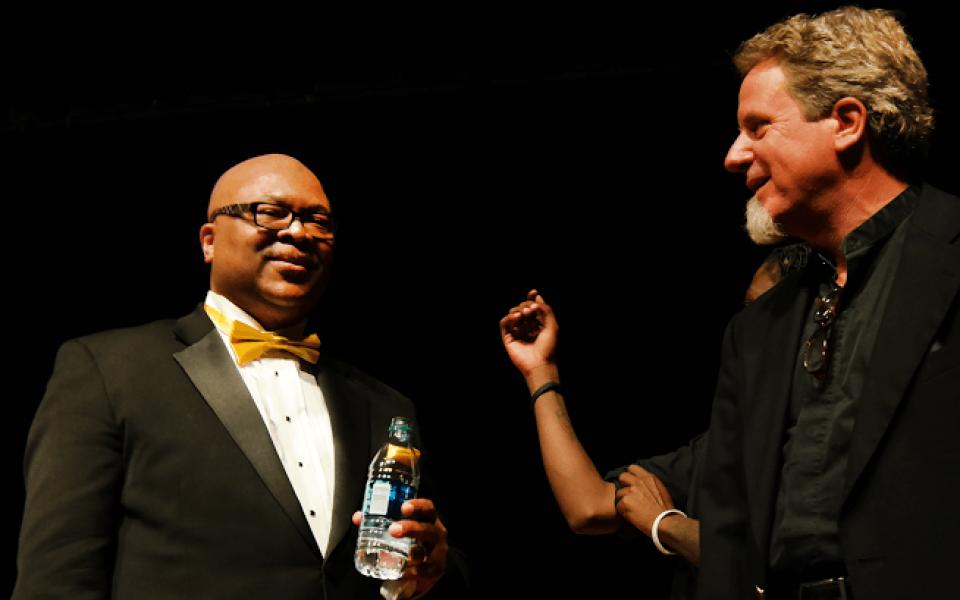by Jordan Green
Mondre Moffett, director of the A&T Jazz Ensemble, stood onstage at Harrison Auditorium last Thursday and introduced Stefan Stuber, whose high school jazz band had the honor of opening the spring concert.
Moffett sounded out the six syllables in the group’s title as if he were the master of ceremonies at the Apollo Theater, each second beat sizzling with excitement and emphasis: “Grim-sley! high school! jazz band!”
The audience, including Chancellor Harold Martin and members of the board of trustees in the second row, murmured appreciatively as Stuber, whose chin is graced with a giant, silver swatch of facial hair, introduced the first selection: “Chick on the Grill.”
The pianist started a rollicking groove on the Latin number with workmanlike bass rumbling beneath, as saxophonists, then trombonists soloed mournfully, pensively, and finally a trumpeter’s solo bloomed brightly.
Stuber clapped emphatically and mouthed the phrasing as the piece came to an explosive close.
“We got a little crazy, but I think we’re gonna bring it back down to earth,” Stuber said, before introducing the Duke Ellington standard “Jeep’s Blues.”
The next day, Moffett and Stuber, along with percussionist Chris Thompson, reflected on the concert in the band room on the first floor of Frazier Hall on the campus of NC A&T University.
“I came up in a musical environment that its core value was making a connection,” said Moffett, a composer and arranger who played trumpet with the venerated Duke Ellington Orchestra from 1995 to 2001. “If you were a musician it was your responsibility to reach down and across, to embrace, learn and inspire.”
The Grimsley High School Jazz Band has developed a reputation for excellence since its founding in 1958, and even opened once for Wynton Marsalis at the Carolina Theatre in Greensboro. But Thompson studied classical percussion under Stuber before matriculating to A&T, where he took Moffett’s History of Jazz class. He felt confident about making a presentation on jazz vibraphonist Lionel Hampton because of the virtuosity instilled in him through his classical training at Grimsley. In Moffett’s class, he fell in love with jazz.
“Chris is definitely the bridge,” Moffett said. He added, “Dr. Stuber invited me to the school. It was such a joy to work with the students that I didn’t want it to stop. I had an objective: Let’s keep this going.”
After closing “A New Kind of Soup” on a rolling boil, the Grimsley players left the stage to appreciative applause.
Moffett introduced an iterated version of the ensemble, billing them as the “A&T Jazz All Stars”: Johnny Jackson on saxophone, Marcus Turner on piano, Byron Carter on bass, Laurence Thompson on guitar and Chris Thompson on vibraphone.
“We will be dealing with some Charlie Parker,” Moffett said. “It’s not easy. You will see what I mean.”
Jackson introduced the melodic line, pensive and frenetic at the same time, piling note atop note in sweet and complicated succession. Moffett followed him, pouring out a skittering line of fractal notes, with Laurence Thompson’s guitar laying a restrained latticework below the solos. Chris Thompson came in at the end, giving the vibraphone an explosive workout.
The chancellor murmured his appreciation throughout and applauded as the audience erupted in cheers at the end.
The A&T players had wanted to build a concert around the theme of Jazz on the Yard. The phrase connotes both the music’s roots and its popular expressions. It’s an of-the-people concept.
“So we thought, ‘Hey, Grimsley — let’s bring them in,’” Moffett reflected. “It has to do with outreach. You might hear a funk piece.”
That ecumenical approach could be heard in Knolan Johnson’s rendition of “Feelin’ Good,” a mid-’60s show tune transformed into a popular social-conscience standard by Nina Simone, and the simmering groove laid down by the ensemble for “Quarter Master” by Snarky Puppy pointing the way to the future. It could be seen in the sudden appearance of two dancers at the conclusion of “Us,” an original composition by Moffett that featured Cyndi Walker on violin.

“Every opportunity is a gateway,” Moffett reflected the next day. “With that dance thing going on, I didn’t want a top professional dancer. I wanted that effect. The roots of African culture was music and dance; they were inseparable. The kid that danced, he was my student in fourth grade in Brooklyn. He came to visit, and I said, ‘You’re my dancer.’ I said, ‘Bring a female dancer with you.’ That young lady, I had never met her.”
Moffett said he wants to challenge his students when he puts together a set. Whether they succeed or not is secondary. He wants to introduce great music, and it’s worth taking a risk that it will fall on its face, he said, expressing faith that if he and the ensemble tend to the integrity of the music, the entertainment function will take care of itself.
“The chancellor’s sitting there; he’s an engineer,” Moffett said. “We’re going to play the music of Charlie Parker. He’s saying to himself, ‘I don’t know music, but I know engineering.’ He knows how things sequence together. He has to be thinking, ‘The mechanics of playing the saxophone that fast — that has to be a challenge.’”
Join the First Amendment Society, a membership that goes directly to funding TCB‘s newsroom.
We believe that reporting can save the world.
The TCB First Amendment Society recognizes the vital role of a free, unfettered press with a bundling of local experiences designed to build community, and unique engagements with our newsroom that will help you understand, and shape, local journalism’s critical role in uplifting the people in our cities.
All revenue goes directly into the newsroom as reporters’ salaries and freelance commissions.


Leave a Reply